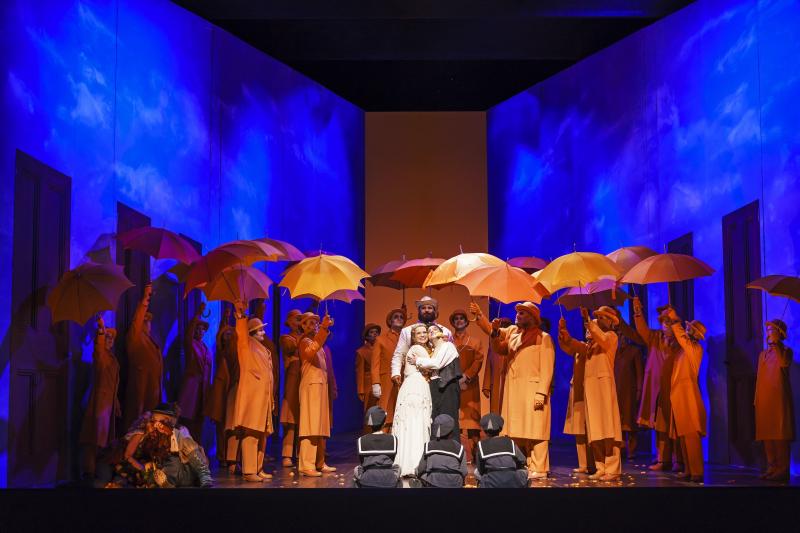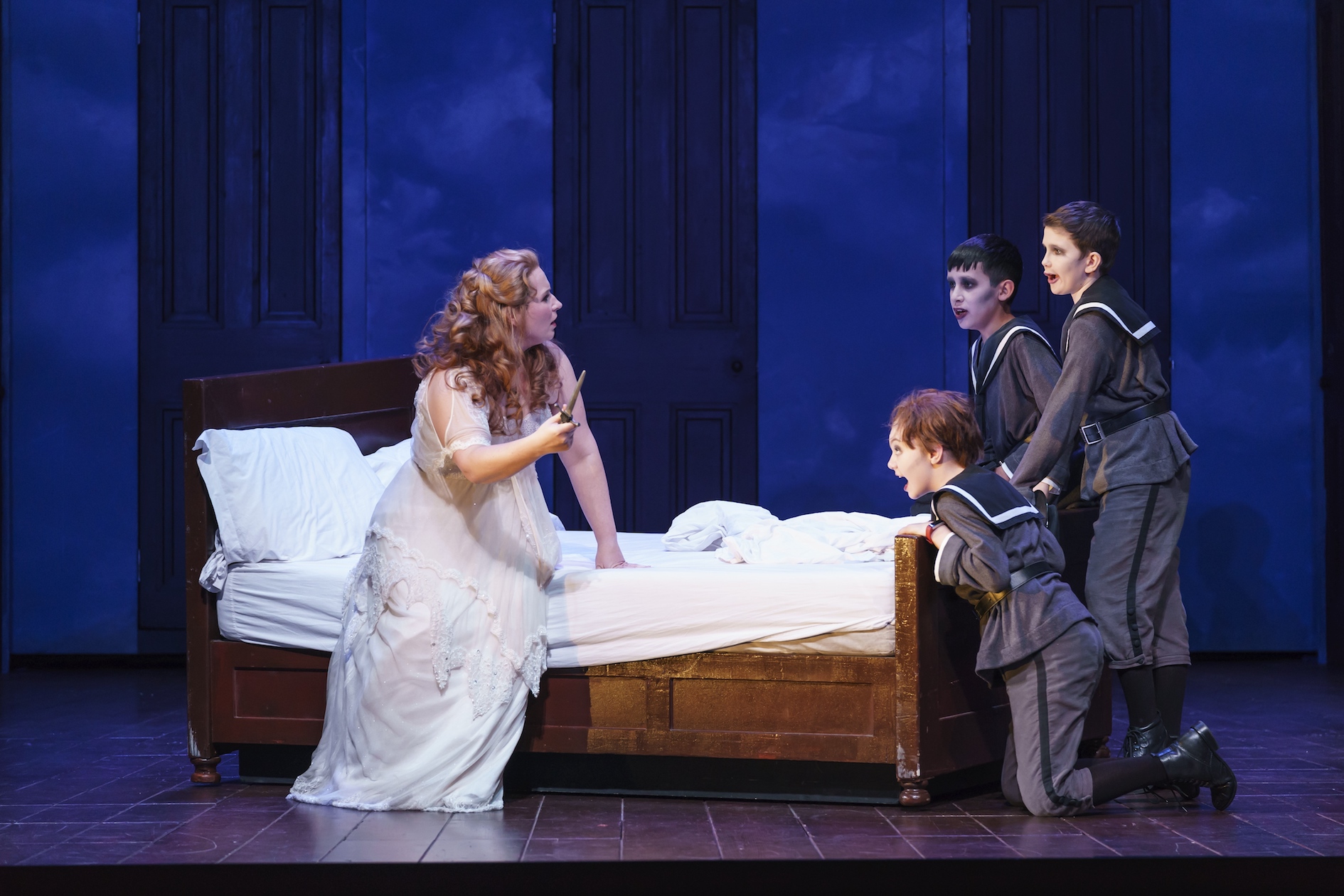The Magic Flute, Welsh National Opera review - charming to hear, charmless to look at | reviews, news & interviews
The Magic Flute, Welsh National Opera review - charming to hear, charmless to look at
The Magic Flute, Welsh National Opera review - charming to hear, charmless to look at
Mozart's pantomime about Nature and Reason stuck in a box

I last saw this Magic Flute, directed by Dominic Cooke, when it was new, some 14 years ago, and I remember it mainly, I’m afraid, for its lack of visual charm.
Of course, the Flute is an embarrassment to your modern director, with its hate-speech about weak, devious womanhood by an authoritarian and not unduly scrupulous male (though in the end Pamina leads the way into the ordeals). But surely it’s possible to imagine one’s own way out of this problem, treat the piece as a pantomime, and bring some verdancy to the settings: after all, the left-hand door is labelled Nature. What is it about the outdoors that seems to terrify opera directors? Papageno, with his bird-cage and feathered coat, belongs exclusively under an open sky, and the Queen of the Night under stars.
Anyway, we have what we’re given, and musically in this revival that amounts to a good deal. There are as yet untidy edges to Damian Iorio’s conducting, shaky ensemble here and there, and some rough dynamic contrasts. But the performance, if short on orchestral refinement, has energy and vitality, moves well on the stage, and is for the most part strongly cast. As before it’s sung in Jeremy Sams’s rather free but clever and musicianly English translation and with plentiful dialogue: all good fun, including broad Welsh accents for Monostatos’s henchmen, and the inevitable north-country for Clare Hampton’s Papagena, but not much other topical or local badinage, such as would surely have been a feature of performances by Schikaneder’s company in 1791.

The vocal range of The Magic Flute, both in terms of register and in sheer colour, is astonishing, from the depths of Sarastro’s “O Isis und Osiris” to the heights of the Queen’s “Der Hölle Rache”, by way of the unashamed and rather effective crooning of Papageno as offered now and then by the excellent Mark Stone, much more at home in this big house than as Longborough’s Germont père last summer, and certainly more amusing. James Platt’s Sarastro is the one disappointment. He has the range, but his phrasing plods in keeping with the stolid image of the white-suited consul in a hot climate that Cooke dumps on him.
Elsewhere, though, there are many lovely things. Ben Johnson is a stylish Tamino, a shade colourless in presence, but nicely focused in voice. Anita Watson (pictured above with the three boys) is the freshest, most natural Pamina imaginable, delightfully uninhibited in her scenes with Papageno, clear-voiced and deeply touching in “Ach, ich fühl’s”, in perfect contrast to the brilliance of the Polish soprano Anna Siminska as her mother (and when, in this trans-everything age will we get an honestly virtuous Queen of the Night and a candidly evil Sarastro? Plausible enough with a few tweaks to the libretto). A decent-living Monostatos would, it’s true, be hard to envisage, though a white, non-Moorish one, as here, is both politically correct and artistically okay. Howard Kirk bounces around with toytown villainy, but sings his aria with fine precision, much helped by superb flute-playing.
Though the ensemble work is occasionally below WNO’s usual standard, the strength is there: a sprightly trio of ladies, immaculately trimmed as chambermaids, and the three “boys”, irresistible as ever with their serene music and ambivalent loyalties. The men of the chorus may not relish having to sing with their heads guillotined by the floorboards, but I suppose it’s where the voice comes out, not where it comes from, that matters.
Add comment
The future of Arts Journalism
You can stop theartsdesk.com closing!
We urgently need financing to survive. Our fundraising drive has thus far raised £49,000 but we need to reach £100,000 or we will be forced to close. Please contribute here: https://gofund.me/c3f6033d
And if you can forward this information to anyone who might assist, we’d be grateful.

Subscribe to theartsdesk.com
Thank you for continuing to read our work on theartsdesk.com. For unlimited access to every article in its entirety, including our archive of more than 15,000 pieces, we're asking for £5 per month or £40 per year. We feel it's a very good deal, and hope you do too.
To take a subscription now simply click here.
And if you're looking for that extra gift for a friend or family member, why not treat them to a theartsdesk.com gift subscription?
more Opera
 Carmen, English National Opera review - not quite dangerous
Hopes for Niamh O’Sullivan only partly fulfilled, though much good singing throughout
Carmen, English National Opera review - not quite dangerous
Hopes for Niamh O’Sullivan only partly fulfilled, though much good singing throughout
 Giustino, Linbury Theatre review - a stylish account of a slight opera
Gods, mortals and monsters do battle in Handel's charming drama
Giustino, Linbury Theatre review - a stylish account of a slight opera
Gods, mortals and monsters do battle in Handel's charming drama
 Susanna, Opera North review - hybrid staging of a Handel oratorio
Dance and signing complement outstanding singing in a story of virtue rewarded
Susanna, Opera North review - hybrid staging of a Handel oratorio
Dance and signing complement outstanding singing in a story of virtue rewarded
 Ariodante, Opéra Garnier, Paris review - a blast of Baroque beauty
A near-perfect night at the opera
Ariodante, Opéra Garnier, Paris review - a blast of Baroque beauty
A near-perfect night at the opera
 Cinderella/La Cenerentola, English National Opera review - the truth behind the tinsel
Appealing performances cut through hyperactive stagecraft
Cinderella/La Cenerentola, English National Opera review - the truth behind the tinsel
Appealing performances cut through hyperactive stagecraft
 Tosca, Royal Opera review - Ailyn Pérez steps in as the most vivid of divas
Jakub Hrůša’s multicoloured Puccini last night found a soprano to match
Tosca, Royal Opera review - Ailyn Pérez steps in as the most vivid of divas
Jakub Hrůša’s multicoloured Puccini last night found a soprano to match
 Tosca, Welsh National Opera review - a great company reduced to brilliance
The old warhorse made special by the basics
Tosca, Welsh National Opera review - a great company reduced to brilliance
The old warhorse made special by the basics
 BBC Proms: The Marriage of Figaro, Glyndebourne Festival review - merriment and menace
Strong Proms transfer for a robust and affecting show
BBC Proms: The Marriage of Figaro, Glyndebourne Festival review - merriment and menace
Strong Proms transfer for a robust and affecting show
 BBC Proms: Suor Angelica, LSO, Pappano review - earthly passion, heavenly grief
A Sister to remember blesses Puccini's convent tragedy
BBC Proms: Suor Angelica, LSO, Pappano review - earthly passion, heavenly grief
A Sister to remember blesses Puccini's convent tragedy
 Orpheus and Eurydice, Opera Queensland/SCO, Edinburgh International Festival 2025 review - dazzling, but distracting
Eye-popping acrobatics don’t always assist in Gluck’s quest for operatic truth
Orpheus and Eurydice, Opera Queensland/SCO, Edinburgh International Festival 2025 review - dazzling, but distracting
Eye-popping acrobatics don’t always assist in Gluck’s quest for operatic truth
 MARS, Irish National Opera review - silly space oddity with fun stretches
Cast, orchestra and production give Jennifer Walshe’s bold collage their all
MARS, Irish National Opera review - silly space oddity with fun stretches
Cast, orchestra and production give Jennifer Walshe’s bold collage their all
 Káťa Kabanová, Glyndebourne review - emotional concentration in a salle modulable
Janáček superbly done through or in spite of the symbolism
Káťa Kabanová, Glyndebourne review - emotional concentration in a salle modulable
Janáček superbly done through or in spite of the symbolism

Comments
Racist and misogynist for
Racist and misogynist for sure, but Bei Mannern, one of the most beautiful duets, could be construed as Homophobic, setting the love of man and wife above all others. But what music throughout the Opera, some of the most sublime ever written .